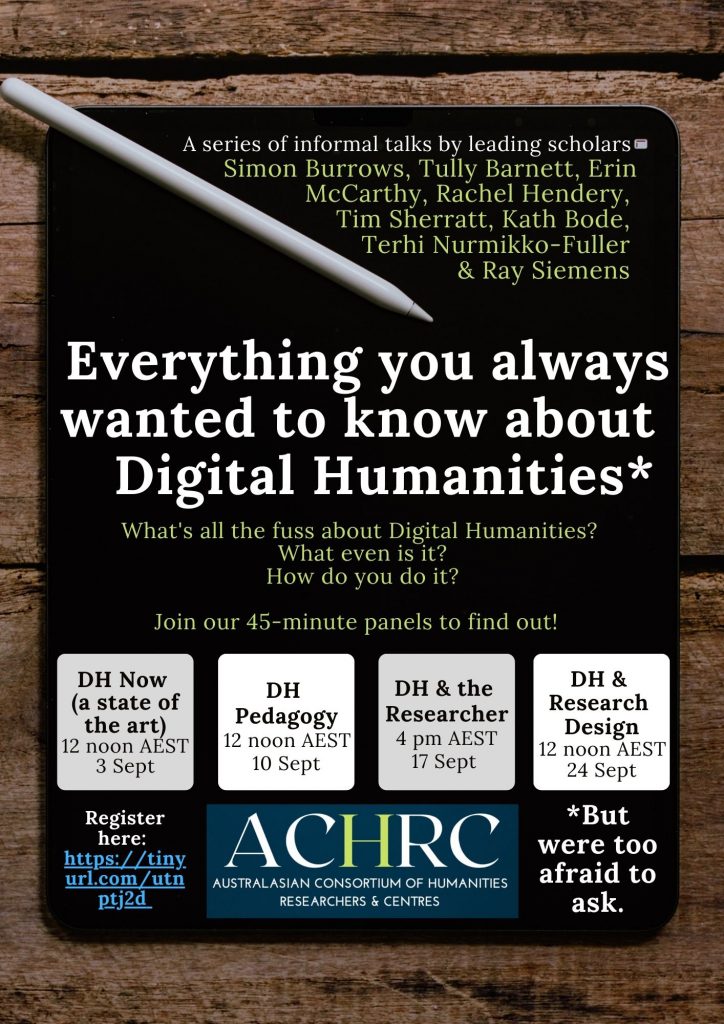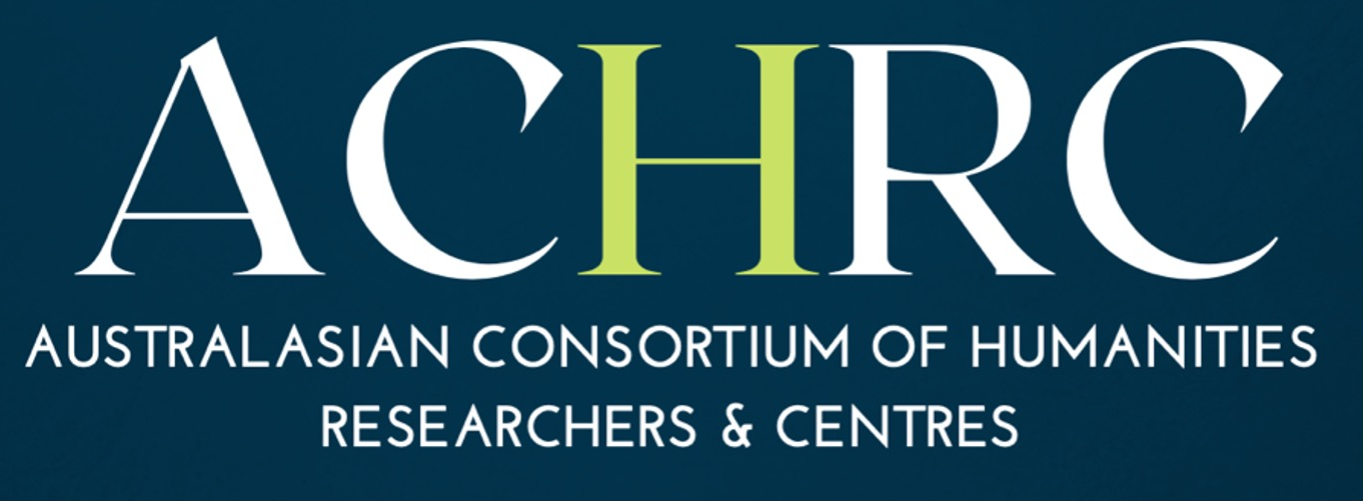Everything you always wanted to know about Digital Humanities (But were too afraid to ask)

The ACHRC presents a seminar series on Digital Humanities (DH) bringing together experts in the field and creating a space for the discussion of key aspects of DH research and its inclusion in teaching, research design, collaboration, networking, and funding applications.
The series consists of four 45-minute informal conversation panels with leading DH scholars across four consecutive Fridays in September. They will be held via Zoom and made available thereafter on the ACHRC website.
To Register please click here
The panels are:
DH Now, A State of the Art
(3 Sept, 12 noon – 12:45 AEST)
Prof. Simon Burrows and Dr. Tully Barnett will consider how DH should be defined, what it is as well as its limits. They will explore whether owing to its broad applications, whether DH is unavoidable for scholars in the Humanities, and whether we are all Digital Humanists now.
DH & Pedagogy
(10 Sept, 12 noon – 1pm AEST)
Dr. Erin McCarthy and Dr. Katrina Grant will be in discussion with Prof. Simon Burrows on DH in the classroom, the benefits, challenges, and obstacles, as well as explore ways to begin integrating DH in course curriculum.
DH & the Researcher
(17 Sept, 4-5pm AEST)
A/Prof. Rachel Hendery and A/Prof. Tim Sherratt will be interviewed by Dr. Tully Barnett regarding their journeys to becoming Digital Humanists. They will discuss what it means and what it takes to be a DH researcher today, and what is it like to lead or to work as part of a DH team, or undertake independent research.
DH & Research Design
(24 Sept, 12 noon -1pm AEST)
A panel discussion with Prof. Kath Bode, Prof. Ray Siemens, Dr. Terhi Nurmikko-Fuller, and Dr. Tully Barnett on how to go about designing a DH research project or using DH methods, the key elements to a good DH project, and what expert examiners look for in grant applications which integrate DH approaches.
Speaker Bios
Simon Burrows is known for his innovative studies of the press and French exile writers in Britain and above all as the instigator and principal investigator of the AHRC-funded ‘French Book Trade in Enlightenment Europe’ (FBTEE) database project which has won wide acclaim among historians, literary scholars, bibliographers and digital humanists, and was awarded the British Society for Eighteenth-Century Studies Digital Resource Prize (2017). Simon is Professor at Western Sydney University and teaches in the History and Political Thought programme. He is leader of the Digital Humanities Research Group and serves on the advisory board of the ACHRC.
Tully Barnett is Senior Lecturer in Creative Industries at Fliders University. She has a DECRA Fellowship for a project looking at digitisation as a cultural practice. In addition, she is a Chief Investigator for the ARC Linkage project Laboratory Adelaide: The Value of Culture, looking for qualitative and quantitative methodologies for measuring and reporting the intangible and non-financial benefits of cultural activities, institutions and events. She serves on the advisory board of the ACHRC and the executive committee of the Australasian Assocation of Digital Humanities (aaDH). She is the co-author of What Matters? Talking Value in Australian Culture (2018, Monash University Publishing).
Erin McCarthy is a digital humanist, literary historian, and lecturer at the University of Newcastle. From 2014 to 2018, she was a Postdoctoral Researcher on the European Research Council-funded digital humanities project ‘RECIRC: The Reception and Circulation of Early Modern Women’s Writing, 1550–1700’ at the National University of Ireland, Galway. She is author of Doubtful Readers: Print, Poetry, and the Reading Public in Early Modern England (2020, Oxford University Press).
Katrina Grant is an art historian at The Australian National University with a background in the study of Early Modern Italy. Her research focuses on gardens and the history of landscapes, as well as the visual culture of theatre and festivals, and the connections between these two areas. Her research focuses on the visual culture of landscape, the way it is shaped, represented and epxeirneced in the pre-Enlightenment era. Her current research focuses on GIS and visualisation technologies and their potential for extending art historical research into new areas. Her main project is Digital Cartographies of the Roman Campagna, which is operating in collaboration with the British School at Rome.
Rachel Hendery is Associate Professor in Digital Humanities at Western Sydney University. She is a linguist who works on language contact and change, particularly in the Pacific, and how new digital tools and techniques allow us to research these in new ways. She developed an interest in digital methods for mapping, modelling, visualising and disseminating linguistic and cultural research. She is the author of One Man is an Island (2015, Battlebridge Publications) and Relative Clauses in Time and Space (2012, John Benjamins).
Tim Sherratt is a historian and hacker who researches the possibilities and politics of digital cultural collections. Tim has worked across the cultural heritage sector and has been developing online resources relating to libraries, archives, museums and history since 1993. He’s currently Associate Professor of Digital Heritage in the Centre for Creative and Cultural Research at the University of Canberra. You can find him at timsherratt.org or as @wragge on Twitter.
Kath Bode is Professor of Literary and Textual Studies and an Australian Research Council Future Fellow working on digital humanities, literary studies, and book history at the Australian National University. Her research investigates Australian literary production, circulation, and reception with digital data, collections, platforms, and methods. She is interested in the critical potential – and limitations – of computational literary studies, a topic that also leads her to consider such things as the nature of archives and future of the humanities. She is the author of A World of Fiction: Digital Collections and the Future of Literary History (2018, University of Michigan Press).
Ray Siemens is Distinguished Professor of English at Victoria University researching Tudor poetry and Renaissance literature, digital humanities, book history, scholarly editing, pedagogy, and scholarly communication. Siemens directs the Electronic Textual Cultures Lab, the Implementing New Knowledge Environments Project, and the Digital Humanities Summer Institute. He has held a number of roles in organisations including the International Alliance of Digital Humanities Organisations, the Canadian Federation for Humanities and Social Sciences, the Canadian Society for Digital Humanities, the Modern Language Association, and SSHRC Council.
Terhi Nurmikko-Fuller is Senior Lecturer in Digital Humanities at the Australian National University. She examines the potential of Linked Open Data to support and diversify scholarship in the Humanities. She has created 3D digital models of cuneiform tables, carved boab nuts, animal skulls, and the Black Rod of the Australian Senate. She member of the Australian Government Linked Data Working Group, a Fellow of the Software Sustainability Institute, UK; a eResearch South Australia (eRSA) HASS DEVL (Humanities Arts and Social Sciences Data Enhanced Virtual Laboratory) Champion; and an iSchool Research Fellow at the Univeristy of Illinois at Urbana-Champaign, USA (2019 – 2021).
